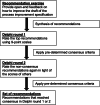How to specify healthcare process improvements collaboratively using rapid, remote consensus-building: a framework and a case study of its application
- PMID: 33975550
- PMCID: PMC8111055
- DOI: 10.1186/s12874-021-01288-9
How to specify healthcare process improvements collaboratively using rapid, remote consensus-building: a framework and a case study of its application
Erratum in
-
Correction to: How to specify healthcare process improvements collaboratively using rapid, remote consensus-building: a frame work and a case study of its application.BMC Med Res Methodol. 2021 Jul 29;21(1):156. doi: 10.1186/s12874-021-01345-3. BMC Med Res Methodol. 2021. PMID: 34325656 Free PMC article. No abstract available.
Abstract
Background: Practical methods for facilitating process improvement are needed to support high quality, safe care. How best to specify (identify and define) process improvements - the changes that need to be made in a healthcare process - remains a key question. Methods for doing so collaboratively, rapidly and remotely offer much potential, but are under-developed. We propose an approach for engaging diverse stakeholders remotely in a consensus-building exercise to help specify improvements in a healthcare process, and we illustrate the approach in a case study.
Methods: Organised in a five-step framework, our proposed approach is informed by a participatory ethos, crowdsourcing and consensus-building methods: (1) define scope and objective of the process improvement; (2) produce a draft or prototype of the proposed process improvement specification; (3) identify participant recruitment strategy; (4) design and conduct a remote consensus-building exercise; (5) produce a final specification of the process improvement in light of learning from the exercise. We tested the approach in a case study that sought to specify process improvements for the management of obstetric emergencies during the COVID-19 pandemic. We used a brief video showing a process for managing a post-partum haemorrhage in women with COVID-19 to elicit recommendations on how the process could be improved. Two Delphi rounds were then conducted to reach consensus.
Results: We gathered views from 105 participants, with a background in maternity care (n = 36), infection prevention and control (n = 17), or human factors (n = 52). The participants initially generated 818 recommendations for how to improve the process illustrated in the video, which we synthesised into a set of 22 recommendations. The consensus-building exercise yielded a final set of 16 recommendations. These were used to inform the specification of process improvements for managing the obstetric emergency and develop supporting resources, including an updated video.
Conclusions: The proposed methodological approach enabled the expertise and ingenuity of diverse stakeholders to be captured and mobilised to specify process improvements in an area of pressing service need. This approach has the potential to address current challenges in process improvement, but will require further evaluation.
Keywords: Best practices; COVID-19; Consensus development; Consensus-building; Delphi technique; Obstetrics; Postpartum haemorrhage; Professional practice.
Conflict of interest statement
The authors declare that they have no competing interests.
Figures
References
-
- Grol R, Wensing M, Grimshaw J. Improving patient care: the implementation of change in health care (third edition) Oxford: Wiley; 2020.
MeSH terms
Grants and funding
LinkOut - more resources
Full Text Sources
Other Literature Sources
Medical


